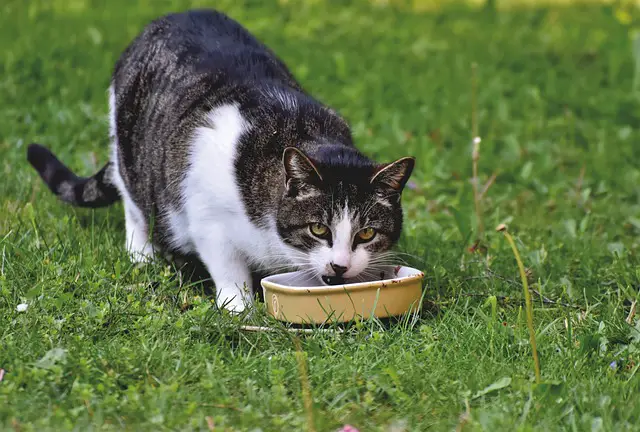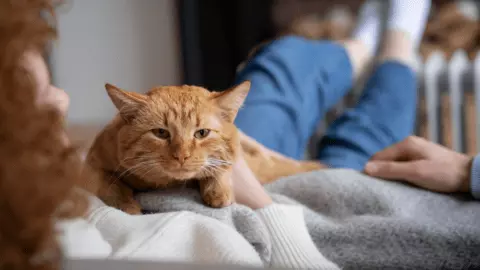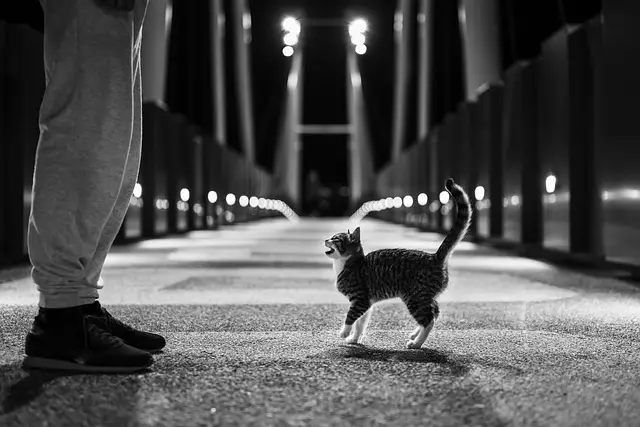Does your feline friend constantly follow you around? Do you often wonder why does my cat follow me everywhere? Cats are mysterious creatures, and their behavior can sometimes leave us puzzled. But fear not because we’ve got you covered! This blog post will explore why your cat might follow you everywhere.
From attention-seeking to boredom, hunger, and even sickness, we’ll delve into the possible motivations behind your cat’s clingy behavior. We’ll also provide tips on how to keep your cat entertained and happy. So grab a cup of tea, and let’s get to the bottom of this mystery!
RELATED: Why Does My Cat Follow Me Then Run Away
Why Does My Cat Follow Me Everywhere? – 10 Reasons
Here are the 10 most probable reasons why your cat is following you everywhere:
1. He Wants Your Attention
Cats are renowned for being independent and distant, yet they can be rather demanding when they need attention. Your cat likely wants your attention if it follows you everywhere, meowing loudly and rubbing against your legs.
Cats are very sociable creatures who want attention and engagement from their owners. They could start following their owners to receive attention if they feel neglected or ignored. Cats often left alone or who recently had a routine change may exhibit this behavior more frequently than other cats.
Your cat may be attempting to tell you it needs attention if it follows you around. As much time as possible should be spent playing, chatting, and caressing your feline buddy. You can deepen your relationship with your pet and ensure it feels loved and content by providing it the attention it desires.
2. He Is In Boredom
Cats may follow their owners around in search of stimulation and excitement when they are bored.
Bored cats may exhibit various behavioral issues, including excessive grooming, scratching, and violence. Consequently, providing your cat with plenty of play and engagement opportunities, including toys, games, and scratching posts, is critical.
Try to create a more fascinating and engaging atmosphere for your cat if they follow you out of boredom. To offer your cat a perspective of the outside world, you may put up a window perch, add new toys, or designate a specific play area.
It’s vital to watch your cat’s behavior and, if required, seek a veterinarian’s opinion since boredom may sometimes indicate underlying stress or worry. You can help your cat live a happier, healthier life by addressing their boredom and giving them the stimulation they need.
3. He Is Very Curious
Cats are inherently inquisitive animals, and this trait may cause them to follow their owners everywhere. If a cat is inquisitive, they can want to explore and look at everything around them, including their owners.
Your cat is interested in what you are doing and wants to participate if they follow you out of curiosity. They could observe you closely as you do your business or try to behave like you.
Being curious is a positive quality for cats since it keeps them active and interested in their surroundings. However, it is crucial to ensure your cat’s safety while they indulge their curiosity. Please confirm there are no dangerous objects for children to enter and keep any harmful materials out of their reach.
Providing your cat with many toys, scratching posts, and other stimulating items will help them stay busy and fulfill their curiosity. Additionally, engaging in interactive play with your cat might assist you and your pet’s relationship to grow closer.
4. He Feels Hungry

Cats often meow, rub against their owners, or even follow them to the kitchen when hungry for a snack.
Confirm that your cat receives the optimum nutrients and volume of food for their age and weight. If your cat continually pleads for food, it may indicate that they aren’t eating enough or that their current diet isn’t satisfying them.
Establishing and adhering to a feeding plan is the best way to avoid overfeeding. Give your cat no table scraps or other human food since these might be unhealthy. Offer your cat high-quality cat snacks instead, which are made to meet their unique dietary requirements.
A veterinarian should be consulted to rule out any underlying medical conditions if your cat looks unusually or excessively hungry. Your cat may maintain a healthy weight and avoid undesirable begging and following tendencies if you provide a balanced diet with enough food and water.
5. He Wants To Play With You
Cats are lively animals that often seek out playtime with their owners. If they follow you and meow, your cat probably wants to play with you. Cats need to play because it keeps them intellectually and physically active and helps to cement their relationship with their feline buddy.
Playing hide & seek or chasing a toy are just a few activities you may do with your cat. Try interactive toys like feather wands, laser pointers, and crinkle balls to get your cat playing and exercising. However, it’s crucial to avoid rough play and use cat-safe toys while playing with your cat.
Take some time out of your day to play with your cat if it follows you and wants to. It may be a pleasant and fulfilling way for you and your animal buddy to connect in addition to helping them with their desire for stimulation.
RELATED: How To Play Fight With Your Cat
6. He Wants Your Company
It’s conceivable that your cat is meowing and following you around because they want to be with you. When left alone, they could feel lonely or bored, and by following you about, they are looking for the security and comfort of your company.
Spending time with your cat each day meaningfully is essential to satiating their desire for company. This might include merely sitting beside one other in a room or hugging and touching. If you keep your cat intellectually and physically active, provide them with stimulation and enrichment, like toys and scratching posts.
Consider adopting a companion cat if you must leave your cat alone for lengthy periods. Cats are sociable creatures and may benefit from interacting with other cats. Alternatively, you may pay a pet sitter to spend time with your cat while you’re gone or ask a dependable friend or family member to assist.
7. Your Cat Is Feeling Sick
Your cat probably feels ill or unwell if they follow you and become more attached than normal. Because cats are experts at masking their symptoms, it’s crucial to closely monitor their behavior and check for any disease indications.
Vomiting, diarrhea, a lack of appetite, a lethargic demeanor, and lethargy are typical symptoms of a sick cat. Take your cat to the veterinarian immediately for a checkup if they follow you around and display any of these signs.
Cats are susceptible to various ailments, from small infections to more severe diseases like renal disease and cancer. It’s critical to seek veterinary care as soon as possible since early identification and treatment may significantly affect the prognosis.
Along with getting veterinary treatment, ensure your cat is comfortable, has access to lots of fresh water, and has a peaceful, cozy area to relax. You can assist your cat in recovering fast and returning to its regular, joyful self by giving them the care and attention they need.
8. He Wants To Show Its Affection To You
Cats express their emotions via various body language cues, and rubbing up against their owners is a typical show of love. Known as “bunting,” this habit allows cats to express love and leave their fragrance on their people.
Other indications of love from your cat include purring, kneading, and licking. To show their love and devotion, cats may often follow their owners about and meow pleasantly.
You should give your cat lots of love and attention to show them you value their adoration. This may include often touching, hugging, and playing with your cat. You may build the tie between you and your furry buddy and establish a happy and rewarding relationship by demonstrating to your cat that you respect their love.
9. He Fells Unexpected Major Change
Cats are sensitive to environmental changes, so if your cat is following you around more often than normal, it’s conceivable that they are experiencing stress or anxiety due to an unanticipated shift.
Moving to a new home, adding a new pet or child, adjusting the daily routine, and even changing the owner’s work schedule may all be stressful for cats. Cats may become clingier or retreat into hiding in response to these changes.
You may do various things to assist if you believe that your cat is stressed out due to a significant shift. First, provide your cat with a calm, cozy space to return to in times of stress. This might be a comfortable cat bed or a private corner in a peaceful space.
You may also use pheromone diffusers or sprays to make your cat feel more at ease and peaceful. The pheromones that cats naturally create are released by these items, which may aid in lowering tension and anxiety.
10. They Want Something From You
Your cat probably wants something from you if they follow you and meow loudly. Cats are clever animals that can express their needs and wants to their owners.
Your cat may be following you and meowing for various reasons, such as needing to eat, play, or go outdoors. Cats may also follow their owners when they require assistance or attention.
You can give your cat the attention and care they need to be healthy and happy if you take the time to learn about their needs and preferences. Giving your cat what they want—whether they want food, playing, or a cuddle—can assist in deepening your relationship with your feline companion.
How Do You Deal With Your Cat Following You?
If your cat seems to be following you wherever you go, it’s crucial to figure out why. When your cat follows you around, try these approaches:
1. Observe Your Cat’s Body Language
To determine how your cat is feeling, pay attention to their tail, ears, and general behavior. Your cat could seek companionship if they seem at ease and comfortable. They can attempt to express a need or demand if they seem disturbed or concerned.
2. Provide Attention And Affection
Cats are gregarious creatures that yearn for their owners’ love and attention. Spend time showing your cat that you care by playing with them, hugging them, or talking to them.
3. Look For Necessities
Your cat may attempt to express a need or demand if it follows you and meows continuously. Ensure your cat has access to a clean litter box, enough food and drink, and a relaxing spot.
4. Encourage Mental Exercise
Cats are naturally inquisitive animals that like exploring and learning about their environment. To keep your cat amused and involved, provide them with toys, scratching posts, and other mental stimulation.
5. Be Mindful Of Your Cat’s Limits
Cats require their freedom and space in addition to enjoying praise and adoration. Give your cat some space and let them approach you on their terms if they appear overstimulated or uninterested in engaging with you.
Also Read: Why Does My Cat Go into Another Room and Meow
Why Is My Cat Suddenly Clingy?

Clinginess in your cat may indicate that they are feeling worried, nervous, or in need of some TLC. The following are some potential causes for your cat’s unexpected attachment issues:
- Alteration To The Norm: Because of their attachment to regularity, cats might get stressed when anything changes, such as eating or when a new family member moves in.
- Health-Related Issues: Cats with hyperthyroidism or renal problems, for example, tend to be more fearful and needier than healthy cats. You should take your cat to the clinic if you notice any drastic changes in its behavior.
- Age: Age may make cats needier and more affectionate toward their human companions.
- Environmental Stressors: Environmental stressors like loud sounds or changes in the home environment may bring anxiety and clinginess in cats.
- Separation Anxiety: When their owners aren’t home, cats may become anxious, too, just like dogs. They may get too attached to their owners as a result.
What Can Be Done To Treat A Cat’s Separation Anxiety?
There are various things you can do to make your cat feel safer and at ease if you think they may be suffering from separation anxiety:
- Desensitization Over Time: Begin by just letting your cat alone for brief intervals, then gradually extend that time. This may make it easier for your cat to adjust to being alone.
- Create A Welcoming Atmosphere: While you are gone, make sure your cat has a cozy and secure area to stay. To keep your cat entertained, give her plenty of toys and stimulating activities.
- Offer Reassurance: Play soothing music or leave a piece of clothing with your smell to relax your cat.
- Speak To A Veterinarian: If your cat exhibits significant separation anxiety, you may want to speak with a vet to see whether medication or other treatments could be beneficial.
Finally, Try These Fun Activities to Keep Them Entertained and Happy
Keeping your cat entertained is important not only for their physical health but also for their mental well-being. Here are some fun activities you can try with your cat to keep them entertained and happy:
- Playtime: Regular playtime is essential for your cat’s happiness. Try different toys, such as wand toys, balls, and puzzles, to keep them engaged.
- Catnip: Catnip is a natural herb that can induce playful behavior in cats. Give your cat some catnip toys to play with.
- Scratching Posts: Scratching is a natural behavior for cats, and providing them with a scratching post can prevent them from damaging your furniture.
- Window Watching: Cats love to observe the outside world. Provide a comfortable spot by the window where your cat can sit and watch birds, squirrels, or other wildlife.
- Treat Time: Treats can be a great way to bond with your cat. Try hiding treats around the house and let them use their hunting instincts to find them.

Hello, this is Frank Swanson, the owner, and operator of Pet Info Hut. I created this website as a way to share my love of pets with the world. I have over 7 years of experience working with animals, and I have a passion for helping people care for their pets. I hope that you find my website useful and informative. Thanks for visiting!
